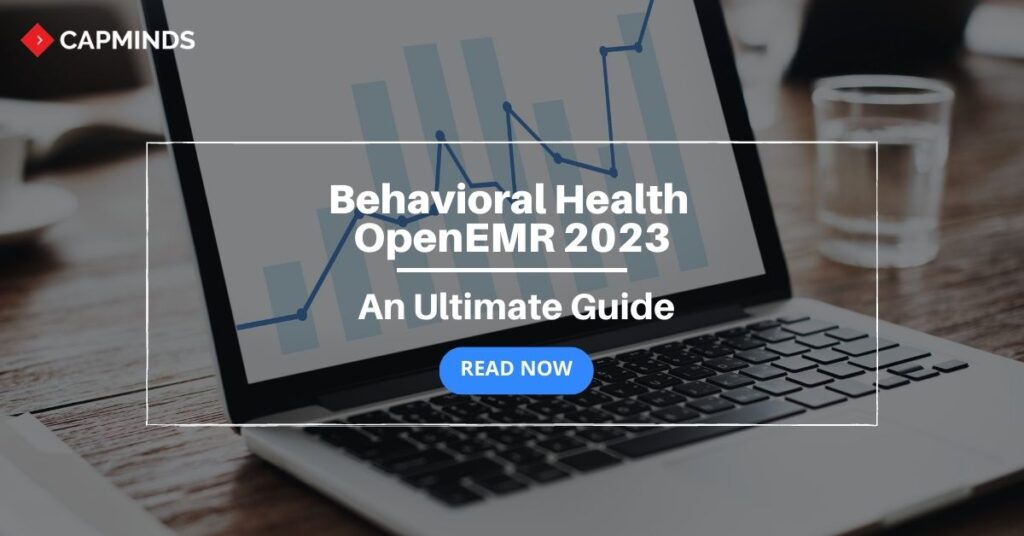An Ultimate Guide to Behavioral Health OpenEMR 2023
What is Behavioral Health?
Behavioral health refers to the branch of healthcare that focuses on the connection between behaviors, emotions, and mental well-being.
It encompasses the assessment, diagnosis, treatment, and prevention of mental health disorders, substance use disorders, and other behavioral or emotional issues that may impact a person’s overall health and well-being.
Influencing Factors on An Individual’s Mental & Emotional State
- Biological
- Psychological, and
- Social determinants
Conditions Commonly Addressed in Behavioral Health
- Anxiety disorders
- Depression
- Bipolar disorder
- Schizophrenia
- Substance use disorders
- Eating disorders
- Attention deficit/hyperactivity disorder (ADHD), and
- Post-traumatic stress disorder (PTSD)
Places of Behavioral Health Service Delivery
- Outpatient clinics
- Hospitals
- Community health centers, and
- Private practices
The goal of Behavioral Health
- To promote mental well-being
- Treat mental health disorders, and
- Improve the quality of life for individuals experiencing behavioral or emotional challenges.
What is Behavioral Health OpenEMR?
Behavioral Health OpenEMR refers to the specific implementation and customization of the OpenEMR electronic health record (EHR) system to cater to the needs of behavioral health practices and organizations. OpenEMR is an open-source EHR platform that provides a comprehensive suite of features and functionalities for managing patient information, clinical documentation, scheduling, billing, and more.
Behavioral Health OpenEMR is a tailored version of OpenEMR that has been specifically adapted and configured to support the unique requirements of behavioral health settings. It includes modules, templates, and workflows designed to facilitate the documentation, assessment, and treatment of mental health disorders, substance use disorders, and other behavioral or emotional issues.
Key features & functionalities of Behavioral Health OpenEMR
1. Customizable Assessment Tools
- Behavioral Health OpenEMR often includes customizable assessment templates and forms that align with the diagnostic criteria and evaluation methods used in behavioral health
- These tools assist providers in conducting comprehensive assessments and collecting relevant patient information
2. Treatment Planning and Goal Tracking
- The system may offer tools for creating individualized treatment plans for patients, allowing providers to set measurable goals, track progress, and document interventions over time
- This feature helps providers develop evidence-based treatment plans and monitor the effectiveness of interventions
3. Medication Management
- Behavioral Health OpenEMR may have specific modules or features that support medication management for mental health disorders
- This includes functionalities for prescribing, tracking medications, monitoring side effects, and ensuring compliance with treatment protocols
4. Integration with Behavioral Health Assessments
- The system may integrate with standardized behavioral health assessment tools or screening questionnaires, allowing providers to administer and score assessments directly within the EHR
- This streamlines the assessment process and helps identify potential mental health conditions or risk factors
5. Reporting and Analytics
- Behavioral Health OpenEMR often includes reporting and analytics capabilities that enable providers to generate reports on patient outcomes, treatment progress, and other metrics
- These features support data-driven decision-making, quality improvement initiatives, and compliance with regulatory requirements
6. Telebehavioral Health Support
- Given the increasing demand for telehealth services, Behavioral Health OpenEMR may incorporate features that facilitate telebehavioral health consultations and remote therapy sessions
- This includes secure video conferencing capabilities and integration with telehealth platforms
Top 10 Behavioral Health Challenges Solved by OpenEMR
Behavioral Health Note Generator in OpenEMR
OpenEMR, as an open-source system, provides a flexible platform that allows for the creation of customized note generators to streamline documentation in behavioral health settings. With the ability to tailor note templates and forms, providers can efficiently capture relevant patient information and generate comprehensive behavioral health notes. Here’s an overview of how a behavioral health note generator can be implemented in OpenEMR:
1. Template Customization
- OpenEMR offers the flexibility to create customized templates specifically designed for behavioral health documentation
- Providers can design note templates that align with their preferred documentation style, including sections for chief complaint, history of present illness, psychiatric assessments, mental status examination, diagnosis, treatment plan, and progress notes
2. Standardized Assessments
- Behavioral health note generators in OpenEMR can integrate standardized assessments and screening tools within the note templates
- Providers can include relevant assessment scales, such as the PHQ-9 for depression, GAD-7 for anxiety, or AUDIT-C for alcohol use, allowing for consistent evaluation of symptoms and severity levels
3. Dynamic Fields and Dropdowns
- To enhance efficiency and accuracy, OpenEMR note generators can utilize dynamic fields and dropdown menus
- These features enable providers to select options from predefined lists or populate specific fields based on the patient’s input, simplifying data entry and ensuring standardized documentation
4. Auto-population and Macros
- OpenEMR allows for the use of auto-population and macros to automatically populate common information into note templates
- Providers can create macros for frequently used phrases, instructions, or treatment recommendations, reducing manual data entry and improving documentation speed
5. Customizable Note Sections
- Behavioral health note generators can offer customizable note sections to address the specific needs of different behavioral health specialties
- For example, sections related to substance abuse history, trauma assessment, or behavioral interventions can be added or modified based on the requirements of the provider’s practice
6. Collaboration and Review
- OpenEMR facilitates collaboration and review of behavioral health notes by multiple providers
- The system allows for easy sharing and access to notes, enabling a coordinated approach to patient care and ensuring continuity in treatment plans
- Providers can add comments or annotations to shared notes, fostering effective communication among the care team
OpenEMR Certification
OpenEMR is an open-source electronic health record (EHR) system and, as such, does not have an official certification process like proprietary EHR systems. However, OpenEMR has undergone various assessments and verifications to ensure its compliance with industry standards and regulations.
Here are some notable certifications and recognitions associated with OpenEMR.
1. Office of the National Coordinator for Health Information Technology (ONC-HIT) Certification
- OpenEMR has achieved the ONC-HIT certification, which demonstrates that the system meets specific requirements and standards for interoperability, security, and meaningful use
- This certification enables eligible providers to participate in the Medicare and Medicaid EHR Incentive Programs
2. Meaningful Use
- OpenEMR has been designed to support eligible providers in achieving meaningful use of EHR technology
- Meaningful use criteria outline specific objectives and measures that EHR systems must meet to improve healthcare quality, safety, and efficiency
- OpenEMR’s functionalities align with these criteria, allowing providers to fulfill meaningful use requirements
3. Health Level Seven (HL7) Certification
- OpenEMR supports HL7 standards, which facilitate the exchange of health information between different healthcare systems and providers
- By adhering to HL7 standards, OpenEMR enables seamless interoperability and integration with other systems, promoting care coordination and information exchange
4. Security and Privacy Compliance
- OpenEMR incorporates various security measures and follows best practices to ensure the confidentiality, integrity, and availability of patient data
- While OpenEMR itself does not have a specific security certification, it provides tools and features that support compliance with privacy and security regulations, like the Health Insurance Portability and Accountability Act (HIPAA)
Final Thoughts
It’s important to note that while OpenEMR has achieved these certifications and adheres to industry standards, the responsibility for ensuring compliance with regulations ultimately lies with the users and implementers of the software. Organizations implementing OpenEMR should conduct their own assessments and follow appropriate security and privacy measures to maintain compliance with relevant regulations.
Additionally, as an open-source project, OpenEMR benefits from a strong community of developers and users who contribute to its ongoing development, improvement, and testing. This collaborative nature helps ensure that the software remains up-to-date and aligns with evolving industry standards and requirements.
Before implementing any EHR system, including OpenEMR, it’s important for healthcare organizations to thoroughly evaluate their specific needs, engage in proper planning, and consider factors like functionality, usability, security, and compliance requirements.
OpenEMR Services from CapMinds
CapMinds OpenEMR consigns clinicians with the best features and ways to integrate. It makes their workflows more efficient and filtered. The integrated features will allow them to combine the ability of patient record management with conceptual and concurrent reminders. This enhances the process of decision-making and improves patient care and quality.
- At CapMinds, custom solutions like OpenEMR are developed with much curation and accuracy to match the special practice needs
- It will be low-cost, the perfect budget solution to the typical traditional subscription-based ones for your behavioral health practice’s long future
- CapMinds OpenEMR prioritizes secure data management & ensures compliance with industry regulations, offering healthcare providers peace of mind
- Exclusive: “Clients can own the code and resell it”
Get the best technologies and HIPAA-compliant and efficient OpenEMR that can be tailored to fit your practice from CapMinds Technology. Our OpenEMR services facilitate a Modern User Interface (UI), customization, production support & training. Also facilitates billing, report & specialty enhancements, clearing house integrations, e-prescription, cloud, and more.
“Get the most experienced, proven, and perfect professional support for your OpenEMR”



